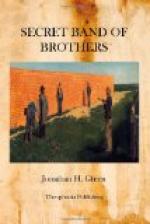It is next asserted, that there were in the lottery one hundred tickets, having three drawn numbers, and entitled each to a prize of $1,000. This I have examined, and I find that, instead of being one hundred, there are but two—the first in magnitude being one from package number six, of half tickets, bearing the numbers 20, 36, 51,—these being the first, second, and eighth of the drawn numbers, and would entitle the holder to one half of the $1,000, subject to a deduction of fifteen per cent. The other is a quarter ticket, bearing the numbers 46, 51, 74—from the twenty-seventh package, of quarters—being the second, fifth, and seventh of the drawn numbers, and would entitle the holder of it to one quarter of the $1,000, after deducting the fifteen per cent. But it is well known that, frequently, scarce one half of the tickets of any one class, intended for a particular drawing, are ever disposed of, and are consequently returned to the manager’s office, to be destroyed. Then, what guaranty have we that the numbers entitled to the above pitiful prizes were sold? They are as likely to be among the tickets returned unsold, as among those sold. Next, the bill states that there were one hundred and ten others, each having three drawn numbers, and were entitled to a prize of $300 each. By a close investigation, I find but one single ticket of this kind in the whole scheme. This is the ticket in the twelfth package of quarters, bearing the numbers 61, 69, 77; and if it had been sold, it would have entitled the holder to one fourth of the $300, deducting 15 per cent. Next, the bill says, those sixty-six tickets having the first and second drawn numbers, will each be entitled to a prize of $100. In searching for these in the scheme-book, I find but one that bears the first and second numbers; that is, in package fourteen. The ticket having the numbers 20, 51, 66, is the only one having the two first numbers; and if sold, the holder was entitled to one half of the $100, it being a half ticket. Now, the reader may perceive that I have examined and laid open, so that he too may examine, this masterpiece of villany. I find that of the two hundred and eighty-six highest prizes, which, their own handbill states, existed in their lottery, and which, by their own figures, amounted to the enormous sum of $195,967, and, in order to be drawn, only required that the tickets should be bought,—I find, allowing every ticket to have been sold, and afterwards every holder presented his ticket for the sum to which it might be entitled, that of the two hundred and eighty-six said to be in the scheme, there are but five, and these very inconsiderable; and that the greatest amount of these five prizes, without deducting the fifteen per cent, is only $875, instead of the enormous sum of $195,967. Can it be possible that any person will be found to patronize lotteries, after considering these facts?




